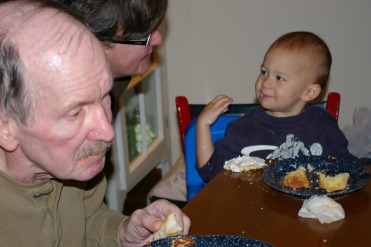Finding Support for Swallowing Problems
Posted: August 31, 2014 Filed under: Alzheimer's, Care-giving, Caregiving, Dementia, Online support, Stroke, support for feeding, Support Groups Leave a commentIt is so easy to feel alone when you are diagnosed with a medical condition that requires modifying and changing all the foods and beverages you eat and drink. We take the ability to eat and drink for granted. After all, you’ve been eating and drinking your whole life!
For many of us, eating and sharing meals is how we socialize. Food also has a strong cultural significance. Not being able to share in the joy and satisfaction of enjoying a meal can leave you feeling isolated. This is why it is so important to find the support for managing you condition.
You are most certainly not alone. In 2013, more than ten million Americans had a swallowing test. The National Institutes of Health estimates that one in six Americans over the age of 60 is having trouble swallowing. The US spent over 500 million dollars in dysphagia-related hospital re-admissions in 2013. The statistics are staggering.
The National Foundation of Swallowing Disorders is a great online source of information and support. (Disclaimer: I am a board member of the National Foundation of Swallowing Disorders) The NFOSD offers topical information, webinars, patient support, education, referrals and all things related to research and treatment for swallowing disorders. The NFOSD webinar series covers topics like how to find the right professional to help with a swallowing disorder, nutrition and dysphagia (my specialty) and more. The goal of the foundation is to “advance the prevention and treatment of swallowing disorders in our lifetime”. For more information, visit this website:
www.swallowingdisorderfoundation.com
Swallowing problems often co-occur with other health issues like Alzheimer’s, ALS, Stroke and Parkinson’s disease. For disease-specific information visit:
ALS Association www.alsa.org
Alzheimer’s Foundation of America www.alzfdn.org
The Alzheimer’s Association www.alz.org
American Parkinson’s Disease Association www.adaparkinson.org
National Stroke Association www.stroke.org
Support for People with Oral, Head, Neck Cancer http://www.sponhc.org
If you are caring for a child with eating or swallowing problems, a great resource is Feeding Matters. Visit their website: www.feedingmatters.org.
If you are looking for support close to home, contact your local hospital. Many hospitals have community outreach and support groups. If your local hospital doesn’t have a swallowing disorder-specific support group, ask them to create one. Or contact your community senior center. Many communities offer support for their aging population.
Making changes to habits and lifestyle can be hard, especially when it is something as basic as eating. Finding the support of others with the condition and from those who treat the condition can make the adjustments and modifications a little easier to swallow.
Finding the “New Normal”
Posted: June 12, 2014 Filed under: Alzheimer's, Care-giving, Dementia, major life events, Nutrition, Purees, Real Food, Strategies, Stroke | Tags: assistance, care-giving, Dysphagia, Stroke, support Leave a commentYears ago, when I brought home my newborn son, I stumbled as I tried to find my “new normal”. Major life events mean that life has to change in a big way. The “normal – normal” seems to no longer exist.
Those first few weeks of caring for a totally dependent new life were exhausting, scary, “real” and totally overwhelming. Days were measured by feedings, naps and diapers. Since eating is such a basic part of living, I expected that feeding my son would come naturally. It didn’t. We had challenges. I met with Lactation Specialists in the hospital. I read everything I could get my hands on. What helped me most was reaching-out to other moms and getting advice. Slowly, as I became more comfortable and confident in my role as mommy/care-giver and after my son started eating regularly, the days started to make sense.
I like to compare my experience as a new mom to what families go through when a loved-one is sent home from the hospital after a stroke or other debilitating illness. Care-givers are thrust into roles they’ve probably never before navigated or at least have never practiced on their wife or husband or parent. Many people are often unprepared for the realities of managing the demands of cooking for someone with a swallowing disorder. Unfortunately, the “old way” of preparing meals won’t work anymore and the transition can be difficult. There are no “pureed diet” cooking shows on the Food Network. No famous chef has written a book about how to make pureed foods and beverages safe, nutritious and delicious…but I have.
I have dedicated my life to helping people eat, drink and return as close to “normal” as possible, as they navigate the road to recovery at home. During the ten years I spent working with staffs in hospitals, rehabilitation units and long-term care facilities, I taught many people how to properly manage foods and beverages for their patients with dysphagia. What I teach isn’t difficult or expensive but it can be critical to caring for someone who is living with a swallowing disorder.
The “new normal” will come with time and with a little instruction, a dose of creativity, and the right products. You can help restore the joy of eating and drinking to someone who is living with dysphagia.
If you need help or assistance, please contact me: laura@dysphagiasupplies.com



Recent Comments